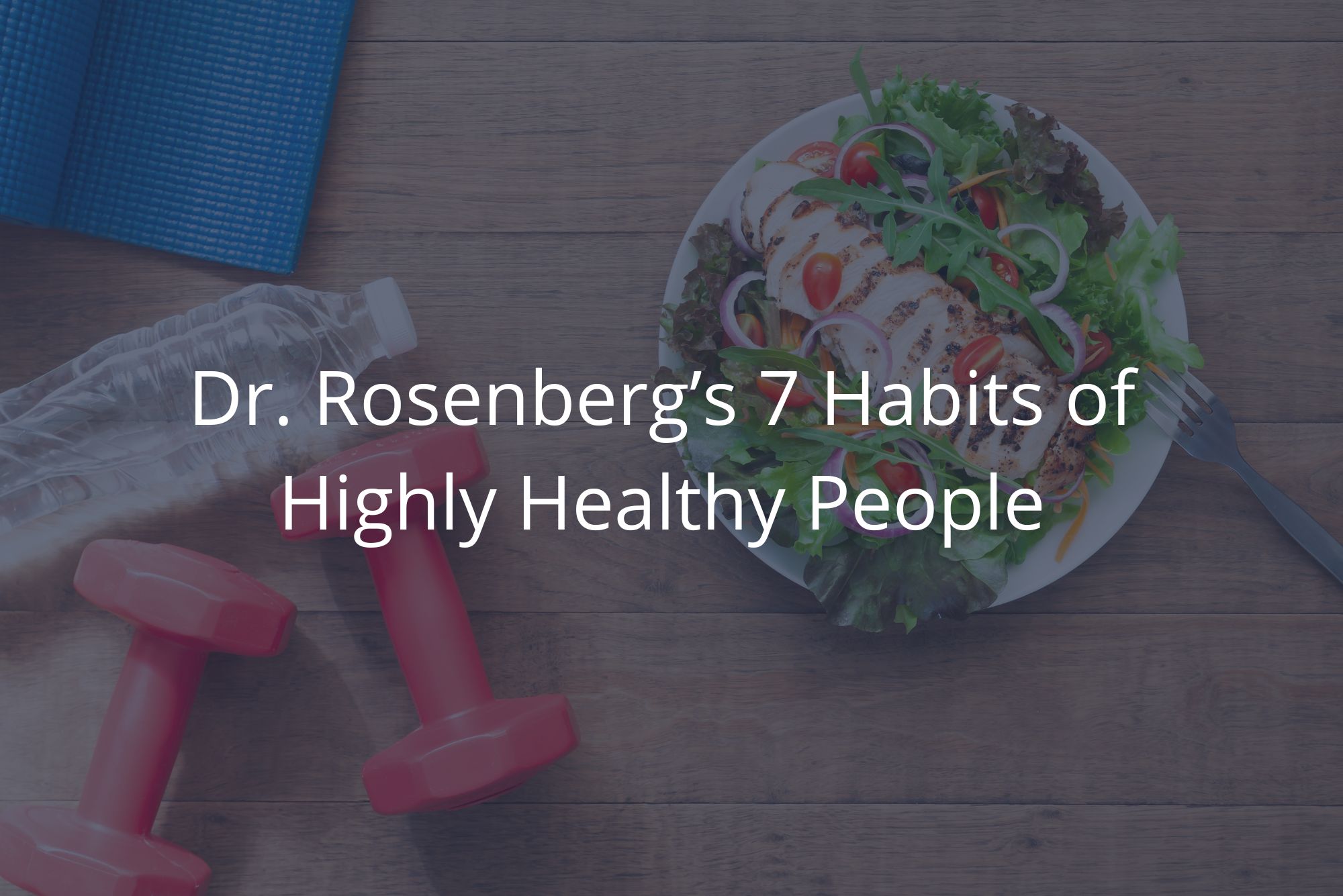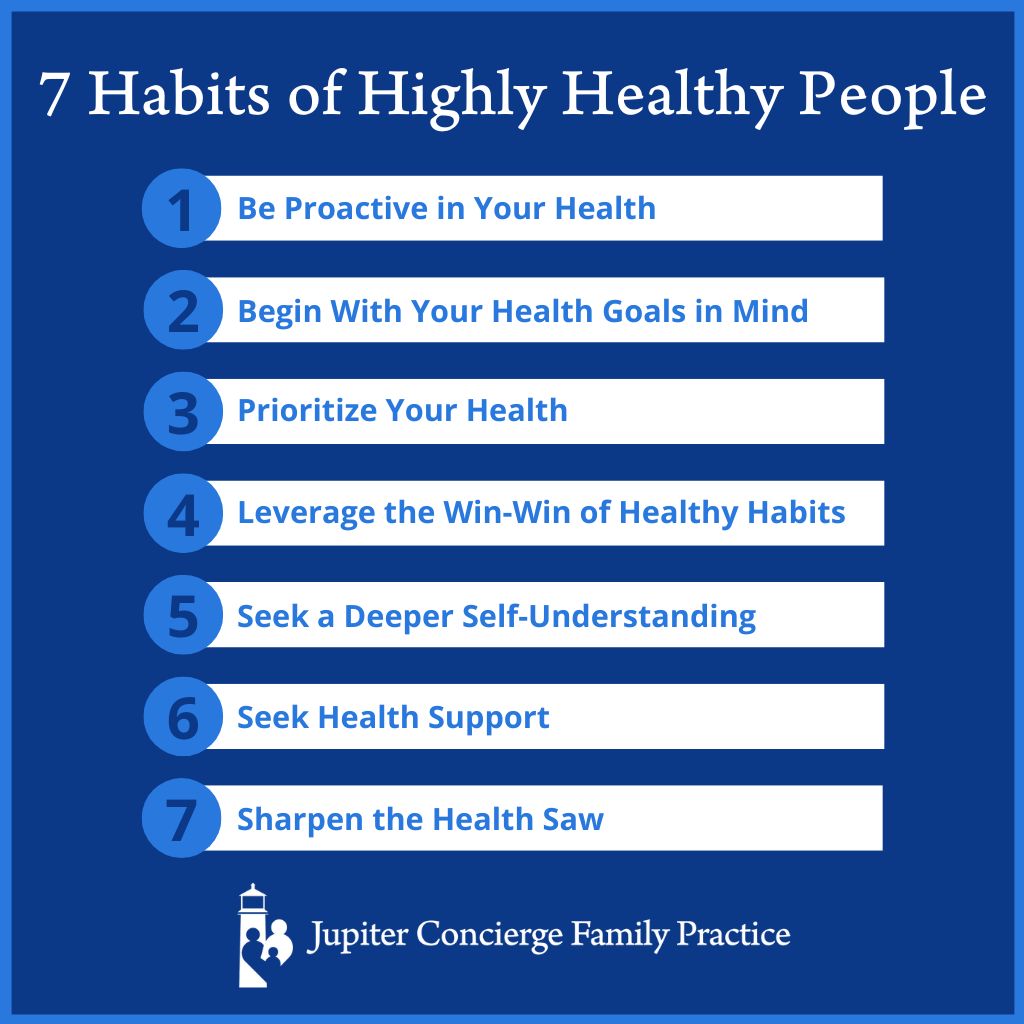
It’s no secret that the modern adult’s time and attention face multiple relentless competitors. Whether it’s falling down an online rabbit hole or over-checking our email, it’s easy for things in our lives to take control of us.
Instead of making proactive decisions that get us closer to our goals and keep us connected to our lives, we end up doing things according to how we’re being pulled. Like magnets, we’re drawn by persistent forces away from our focus. And those forces are many.
This affects our health. We engage in habits each and every day that shape our health. Whether we choose these habits or default to them makes a gargantuan difference in our well-being. We must be intentional if we want to reach our goals. Otherwise, we become victims of advertising and good marketing, and we lose our health in the process.
Effective antidotes to distracting time-suckers do exist, and you can find many of them in helpful self-development books. One of my favorites, Stephen Covey’s The 7 Habits of Highly Effective People, has sold over 40 million copies and has been translated into 50 languages for a reason. Its approach is timeless and broadly applicable.
In today’s post, we’ll revisit Covey’s seven classic habits specifically as they apply to our health.
1. Be Proactive in Your Health
Being proactive helps us become more focused on the things we want to do for our health, and it helps us actually get there.
Too often we wait for something bad to happen and then try to correct it. Instead, decide you’re going to be responsible for your health, and don’t wait for your yearly physical to get started.
Being at the helm of your health can help you avoid recalcitrant health conditions. It also means ridding yourself of excuses that might delay your health goals. You don’t have to (and shouldn’t!) wait on anyone else — not your physician, your trainer, your spouse, or your running buddy — to pursue a healthy life.
Take action:
- Assess your lifestyle. Take an honest look at your habits, both the intentional and the unintentional. To what ends are they leading you? Say, for example, you like to have a couple beers each night to unwind. There’s actually a lot of harm in that habit, especially over time. Or maybe you have back pain that flares up when you try to exercise, so you don’t exercise at all — also not a good long-term habit. What exercise could you do that won’t exacerbate the pain, or how can you address your back problem to allow for exercise?
- Pursue preventative care. Get screenings, assessments, and proactive care. Stay on top of your health stats, so you know what’s going on.
2. Begin With Your Health Goals in Mind
What do you want? Before you can be more focused on the things you want to do, you must identify what they are.
It can be as simple as spending time with the people you care about, versus wasting time on diversions you won’t remember the next day. Whatever your goal is, start with what you desire and make the decision to do it.
This comes down to your personal values. What do you value? Do you want to be comfortable and chill on weekends? Do you want to participate in strenuous athletic competitions? Do you want to be active so in 10 years you have the energy and strength to play with the grandkids?
Take action:
- Write it down. Listing your goals out in written form makes them more concrete and attainable. Ask yourself what you want for your health, and then answer yourself. Starting with the end goal helps you work backward and figure out the steps you need to take to get there.
3. Prioritize Your Health
Right now, with very little effort, you can probably call to mind things you “need” to do. Stuff that feels urgent and undone — laundry, email, and all the other unending tasks. And yes, we need to do the laundry and we need to answer (some of) our emails. But we need to do those things after we care for our health.
Once you’ve decided your health is a priority, put it first, before the incessant, menial tasks of every day.
Putting your health first ensures it actually gets the attention it needs. If you don’t make it a first priority, there’s a good chance it won’t get any of your time. It’ll wind up at the bottom of the heap, under all the distractions and endless to-dos.
Too many times we do the least important things first just to get them out of the way, but the emails will keep coming and so will the dirty socks. Make sure your health is intact first so you can better meet the demands — and the joys — of your life.
Take action:
- Create a schedule that works for you. Make yourself an attainable schedule with the 4 Pillars of Health in mind: exercise, food, stress, and sleep.
- Exercise: Create a schedule for exercise. Choose things you can do without hurting yourself.
- Food: Plan your meals and shop ahead of time. That way you won’t fall prey to shiny, easy convenience food.
- Stress: We often overestimate what we can accomplish in a day and underestimate what we can do in a year. Underschedule yourself on a daily basis.
- Sleep: Set a sleeping schedule and stick to it. You need to sleep, full stop.
4. Leverage the Win-Win of Healthy Habits
The good news is that healthy habits are mutually beneficial across the entire fabric of your life. There’s just no such thing as mutual exclusivity in healthy habits. It’s like the expression, A rising tide lifts all ships. Every aspect of your life improves when you consistently prioritize your health.
Being the healthiest version of yourself at any given moment positively impacts your social life, your family relationships, your career, your everything.
Take action:
- Creatively integrate your health habits into your life. Take a look at your life and see what ways you can connect your health with other things you care about, for the amplification of all.For example, if exercising feels too time-consuming, incorporate the people you care about into your exercise. Jog with a friend or your spouse. Go on a hike with your family. That way, you’re all benefitting on multiple levels.Or maybe you’re in the midst of a big project at work, and you’re tempted to keep at it into the night. Remember and believe that if you get a good night’s sleep and don’t skip your morning exercise, you’ll have more energy and concentration to devote to your hours of work.
5. Seek a Deeper Self-Understanding
In Covey’s book, the fifth habit is Seek to understand, then be understood. In the case of our health goals, I think we need to develop a deeper understanding of ourselves. When we understand what we want and need, we can make consistent choices that make us healthier.
Each of us is different, and no one plan will do for all. Instead of trying to force yourself into habits that grate against you, consider your unique tastes, preferences, desires, and goals, and incorporate them into your plan.
If you love tennis, make that your physical activity. If you prefer swimming, join a pool. Do you thrive with routine, or does changing up your exercise keep you motivated? If you favor a Mediterranean diet, find outstanding tabouleh recipes. If you love Asian foods, develop a menu of healthy options.
In other words, honor your preferences and aversions, and allow yourself the level of diversity you need to make it fun.
Take action:
- Cultivate self-understanding. Discover and respect your preferences. Find creative ways to incorporate them to manage the 4 Pillars of Health in your life.
6. Seek Health Support
Humans are wired to be social creatures, and we can accomplish so much more together than we can alone. That’s why we say two heads are better than one. Finding ways to creatively cooperate with other health-conscious people is deeply beneficial to your health.
Your physician is one obvious resource for supporting your health goals. This is why I’ve chosen to practice concierge medicine — it gives me the time and freedom to develop deeper, more collaborative relationships with my patients so we can work together to achieve their health goals.
Take action:
- Expand your circle of connection and influence. Join a cycling club or a community dance class. Make sure you have a collaborative medical team behind you. Find like-minded people with whom you can grow, play, and learn.
7. Sharpen the Health Saw
This habit is about allowing yourself to pause and reset. Being healthy requires hard work. Occasionally getting out of your routine is important and can lead to any number of unforeseen gifts.
This might sound funny, but don’t pursue health at the expense of your health. Remember why you’re doing these things. Healthy habits aren’t sustainable if you’re only suffering.
Take action:
- Give yourself a break. Do you love tiramisu? Have a small piece on a special occasion. Infrequent indulgences will do you zero harm, and they’ll provide a restful break.Build in one or two days of rest from exercise each week. Recovery days are just as important as exercise days.Giving yourself recovery time in every facet of your life will allow you to fully integrate the healthy habits and choices you’re making. And it will give you the flexibility to continue discovering what you like and need.

Dr. David Rosenberg
Dr. Rosenberg is a board-certified Family Physician who obtained a BS in Chemistry at Georgia's Mercer University in 1983 and a medical degree from the University of Miami in 1988. He completed his residency in Family Medicine at The Washington Hospital in Washington, Pennsylvania, in 1991 and then practiced Emergency Medicine at Palm Beach Gardens Medical Center for two years. In 1993 he started private practice in Jupiter.
Dr. Rosenberg has been married to his wife Mary for 38 years and they have three grown children together. Some of his interests include being a huge baseball fan, sailing, snow skiing, self-development, and learning to play piano.

